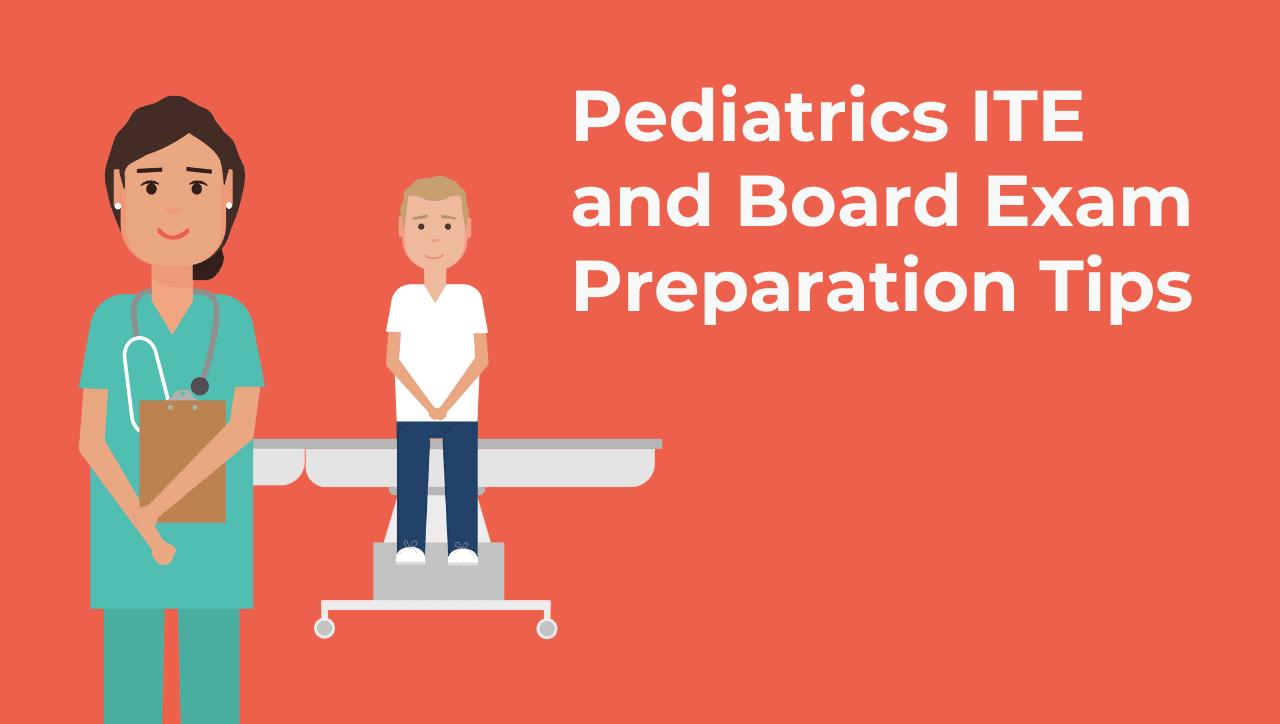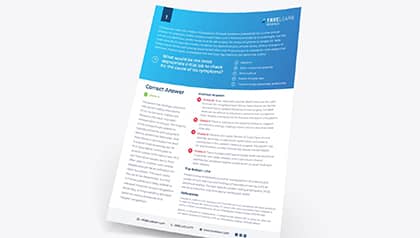Passing Pediatric Boards Is Determined by How Well You Prepare
Making it through medical school is a huge milestone, as the primary focus of your time shifts from acquiring medical knowledge to applying learned skills for patient care. While the days of daily lectures, nightly flashcards, and bi-weekly tests may be behind you, maintaining and expanding one’s knowledge base is a professional responsibility. You need to retain the hard-won knowledge acquired in medical school and to keep abreast of the new developments in your field.

In addition, while exams are less frequent in residency training and beyond, they are an inevitable reality of life in medicine: doctors must complete both the in-training exams administered to current residents and the board exams required for licensure at the end of training. While I have yet to sit for the Pediatric Boards, my performance on the second-year in-training exam was in the 99th percentile for all second-year pediatric trainees and well above a passing score for equivalent performance on the Board Exams, so I feel I have some expertise in commenting on effective strategies needed to pass pediatric boards.
Finding the Best Pediatric Question Banks & Resources
As a current resident in pediatrics, I know the difficulty of studying while in training. After working for as many as 28 hours in a row, the prospect of spending any additional time reviewing medical topics can be daunting. Given this, I want the time I do spend studying to be efficient, meaningful, and high-yield. Moreover, as a current tutor for the USMLE, I know the importance of internalizing knowledge when it is most salient to you – which is often when it is pertinent to the care of a particular patient.
Through my work with dozens of students, I also know that the best way to create and maintain a solid knowledge base is not through cramming for a test but rather through continual active learning in small, repetitive chunks over long periods. I would therefore like to outline some of the resources I have used for studying while in residency, which I would recommend to anyone currently studying for the Pediatrics In-Training Exams or Pediatric Board Exams.
1. Pediatrics in Review
Pediatrics in Review remains a treasured resource for rapid review of general pediatric topics. Published once monthly, this journal is free to all pediatric trainees through the American Academy of Pediatrics. This journal has several features that make it an excellent resource for learning while in training. First of all, the articles are thorough yet concise, summarizing topics with sufficient depth to provide meaningful commentary while providing sufficient depth to offer a comprehensive overview of the topic in question. Second, the three longer articles in each issue have review questions that help promote learning and retention of the knowledge provided. Third, there are always several case studies presented, which help contextualize the information presented and increase its salience to patient care.
2. Free AAP “PREP” Questions
Besides Pediatrics in Review, the AAP offers approximately 300 free practice “PREP” questions per year designed specifically to review topics that are high-yield for board examinations. These questions are in the multiple-choice format that will be tested on the ITE and board exam, and feature comprehensive explanations with references to the current pediatric literature. While the knowledge presented in this question bank is excellent, the interface itself leaves something to be desired, as there is no way to select individual questions, only to review them in the order they are presented in the question bank, or to review questions previously answered incorrectly. In addition, there is no mobile app for these questions, limiting their utility for learning on-the-go.
3. Dosed Daily
Dosed Daily is another question bank that is free to pediatric trainees. These questions are designed for daily rapid review, and can be delivered once daily to your email inbox. The topics are curated to review the latest from pediatric literature, and generally feature concise answer summaries with links to the relevant literature in question. This is among the best resources for rapid review of new findings in pediatric research, and the website features an index of old questions for more comprehensive review, if so desired.
4. NEJM Knowledge+
Among paid content, the NEJM Knowledge+ Question Bank offers a comprehensive, interactive alternative to the above options. The NEJM QBank has several strengths: first, questions are easily sorted by sub-discipline, making the app a useful resource for rotation prep and rapid review of particular topics. In addition, the program keeps track of all questions previously answered and allows the learner to review only unseen questions, review previously missed questions, or review all questions (correct, incorrect, and unseen) in an adaptive manner that takes into account prior performance in a given topic area, time since reviewing a given question, and self-assessed confidence when answering the question. The program then offers several metrics for continual self-assessment, including percentage correct by category and by degree of confidence so as to identify areas of both overconfidence and misbegotten hesitance in a particular topic area. In addition, the program is available in both computer- and mobile phone-friendly versions, facilitating rapid learning on the fly.
Finally, questions have both brief and more thorough explanations, enabling more cursory review of familiar topics while simultaneously offering a comprehensive summary for less well-known subjects. While this question bank carries a not insignificant price tag at $400 per year for trainees and $650 for attendings, the cost helps facilitate continual updates and expansions to the question bank, ensuring ongoing relevance of the questions provided.
5. TrueLearn Pediatric SmartBanks
TrueLearn is another newer test review platform with several attractive features. To begin, TrueLearn actually has two separate “SmartBanks” (q-banks) for the Pediatric ITE and Board exams with different content in each. The company also claims that they refresh their content by 50% each year so that residents are always receiving new content to study. Similar to the NEJM QBank, TrueLearn’s pediatric question banks allow for easy subdivision of questions by subject areas and offers modes to review new vs incorrect vs new and incorrect vs all questions, and has timed test, untimed test, and tutor modes. Each question has detailed explanations with references to pediatric literature which are thorough but sufficiently concise to allow rapid review. The feedback provided by the program is excellent in that learners know both the percentage of respondents who chose each answer and get feedback on the average test performance among all test-takers, allowing for real time comparisons of preparedness relative to other learners to provide a realistic self-assessment.
Among unique features, TrueLearn has an innovative texting feature to send text message summaries of the answers to questions answered incorrectly, sent at a frequency proportional to the time remaining prior to exam day. In addition, TrueLearn offers the ability to search questions by keyword. The search will result with previously taken questions, and if you got those questions correct or incorrect, as well as new questions with that keyword. This feature allows you to not only study certain topics on the Pediatric ITE or Board Exam, but also other closely related subjects. Unfortunately there is no feature to make flashcards with text or images.
Finally, like the NEJM QBank, TrueLearn offers a mobile app to facilitate learning on the go. Pricing wise, it is similar to NEJM at $405 per year, just over a dollar per day. TrueLearn does offer a discounted trial period so that residents can test it out before completely committing.
In the end, there are many effective study resources; the single most important factor in ensuring strong exam performance is consistent, daily work. Less important than the exact resource(s) used is the presence of a consistent, good-faith effort at working through content on a regular basis. Best of luck in your exam prep!
Committed to providing objective USMLE resource reviews to guide students through their studies, this article is written by the tutors at Elite Medical Prep.


